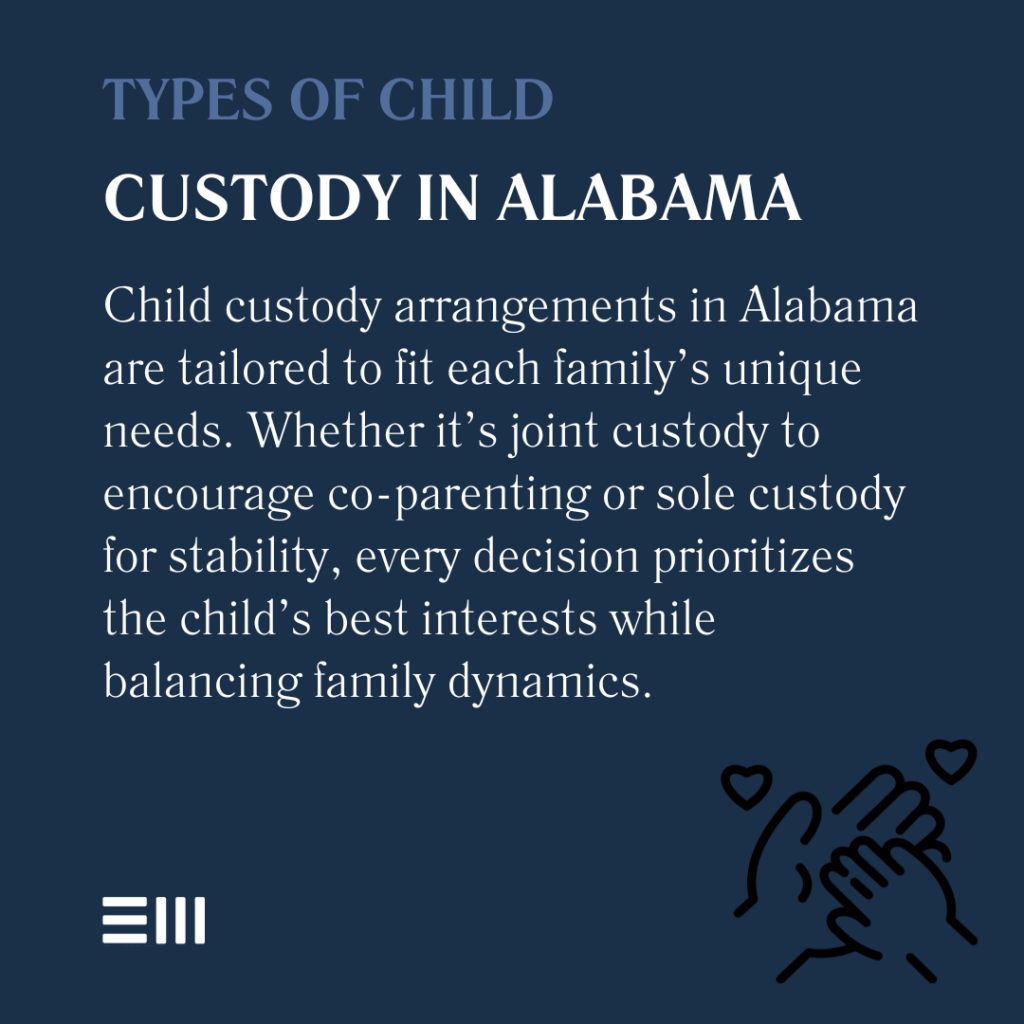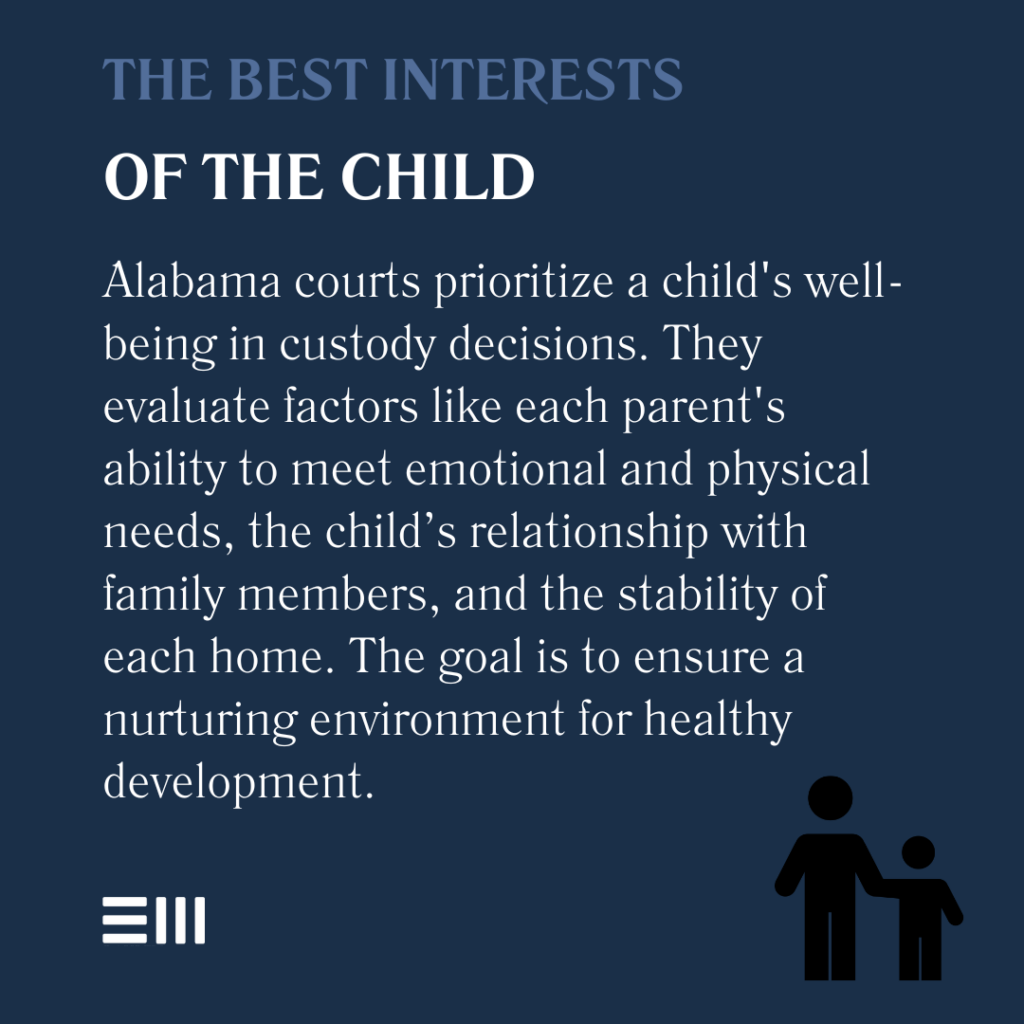
Every evening, thousands of Alabama parents say goodnight to their children through phone screens. Others mark their calendars, counting days until their next weekend together.
Behind these moments lie Alabama’s child custody laws—rules that shape not just schedules but childhood memories and parent-child bonds.
The Foundation of Alabama Custody Law
Alabama’s approach to child custody has evolved to reflect modern family dynamics and child development research. Understanding these foundational principles helps parents navigate the custody process more effectively.
Key legal principles include:
- Equal rights of both parents to seek custody;
- Priority of children’s best interests in all decisions;
- Recognition of various family structures;
- Protection of parent-child relationships;
- Importance of stability in children’s lives;
- Rights of children to maintain family bonds;
- Balance between consistency and flexibility; and
- Support for cooperative co-parenting.
These principles guide every aspect of custody proceedings. Understanding them helps parents align their approach with court expectations.
Types of Child Custody in Alabama
Alabama courts recognize different forms of custody arrangements to meet the unique needs of each family situation. Understanding these distinctions helps parents navigate their options and work toward arrangements that serve their children’s best interests.
Legal custody arrangements include:
- Sole legal custody, where one parent makes major decisions about education, healthcare, and religion;
- Joint legal custody, where both parents share decision-making responsibilities;
- Sole physical custody, where children primarily live with one parent;
- Joint physical custody, where children spend significant time with both parents;
- Bird’s nest custody, where children remain in the family home while parents alternate stays;
- Split custody, where siblings are divided between parents;
- Temporary custody during divorce proceedings; and
- Emergency custody in crisis situations.
Each arrangement comes with its own considerations and impacts on family life. The right choice depends on your family’s specific circumstances and needs.

Best Interests of the Child Standard
Alabama courts prioritize children’s well-being above all other considerations when determining custody arrangements.
This approach ensures that the focus remains on providing the most nurturing environment possible for child development.
Key factors courts consider include:
- Each parent’s ability to provide for the child’s physical and emotional needs;
- The child’s relationship with each parent and other family members;
- The child’s adjustment to home, school, and community;
- Each parent’s physical and mental health;
- Any history of domestic violence or substance abuse;
- The child’s preferences, depending on age and maturity;
- Each parent’s willingness to support the other’s relationship with the child;
- Geographic proximity between parents’ homes;
- Stability of each parent’s home environment;
- Quality of schools in each parent’s district;
- Extended family support systems; and
- Each parent’s work schedule and availability.
Understanding these factors helps parents focus on what matters most to courts when presenting their cases. Courts carefully weigh all evidence to determine optimal custody arrangements.

Creating a Parenting Plan
Effective parenting plans provide clear frameworks for co-parenting success. Detailed planning helps prevent future conflicts and ensures children’s needs remain consistently met.
Essential elements of parenting plans include:
- Regular visitation schedules for school weeks and holidays;
- Transportation arrangements between homes;
- Communication methods between parents;
- Decision-making processes for major life choices;
- Methods for handling schedule changes;
- Plans for special occasions and school events;
- Healthcare management procedures;
- Emergency contact protocols;
- Religious upbringing agreements;
- Educational decisions and involvement;
- Extra-curricular activity participation;
- Technology and social media guidelines;
- Travel and vacation planning; and
- Financial responsibility allocation.
Well-crafted plans provide stability for children while allowing flexibility when needed. Regular review and updates ensure plans continue meeting family needs.
Communication and Documentation
Effective communication plays a crucial role in successful custody arrangements. Proper documentation helps prevent misunderstandings and provides evidence if disputes arise.
Important communication practices include:
- Using approved communication methods;
- Maintaining respectful tone and language;
- Documenting all significant interactions;
- Keeping records of expenses and reimbursements;
- Tracking visitation schedules and changes;
- Saving relevant emails and text messages;
- Recording medical and school information; and
- Maintaining calendars of events and activities.
Good communication habits support successful co-parenting relationships. Professional guidance helps establish effective communication systems.
Modifying Custody Arrangements
Life changes sometimes necessitate custody modifications. Alabama law provides processes for adjusting arrangements when circumstances significantly change.
Valid reasons for modification may include:
- Relocation of either parent;
- Changes in work schedules or employment;
- Health issues affecting parenting ability;
- Children’s changing needs as they grow;
- Evidence of unsafe living conditions;
- Substantial lifestyle changes;
- Repeated violation of existing orders;
- Children’s educational requirements;
- New marriage or relationships;
- Financial situation changes;
- Medical needs developments; and
- Safety concerns emergence.
Courts require clear evidence that modifications serve children’s best interests. Understanding modification standards helps parents prepare appropriate requests.
Enforcement of Custody Orders
Alabama provides various mechanisms for enforcing custody orders when violations occur. Understanding these tools helps parents protect their rights and their children’s stability.
Enforcement options include:
- Court contempt proceedings;
- Make-up parenting time;
- Police assistance in serious situations;
- Modification of existing orders;
- Financial penalties;
- Mandatory parenting classes;
- Supervised visitation requirements;
- Mediation services;
- Custody evaluation orders;
- Parent coordination programs;
- Court-ordered counseling; and
- Legal fee assignments.
Professional guidance helps parents choose appropriate enforcement methods while maintaining focus on children’s wellbeing.
Special Circumstances in Custody Cases
Some situations require particular consideration in custody determinations. Understanding these special circumstances helps parents navigate complex scenarios effectively.
Special considerations may include:
- Military deployment impacts;
- Interstate custody issues;
- International custody concerns;
- Grandparent visitation rights;
- Step-parent relationships;
- Special needs children;
- Substance abuse recovery;
- Mental health management;
- Same-sex parent rights;
- Adoption considerations;
- Foster care transitions; and
- Educational special needs.
Professional guidance ensures proper handling of complex custody situations. Each circumstance requires careful attention to legal requirements and family needs.
Impact of Domestic Violence
Domestic violence significantly affects custody determinations in Alabama. Understanding these impacts helps protect children and vulnerable parents.
Key considerations include:
- Safety plan development;
- Supervised visitation requirements;
- Protection order coordination;
- Emergency custody provisions;
- Counseling requirements;
- Security measures implementation;
- Evidence documentation;
- Support service access;
- Legal protection options;
- Child advocacy services;
- Safe exchange procedures; and
- Therapeutic intervention needs.
Professional guidance helps ensure safety while maintaining appropriate parent-child relationships.
Frequently Asked Questions About Child Custody in Alabama
Parents often have many questions about Alabama child custody laws.
Here are answers to common concerns that arise during custody proceedings.
How Do Courts Determine the Best Interests of the Child?
Courts evaluate multiple factors, including stability, relationships with family members, educational opportunities, and each parent’s ability to meet the child’s needs.
Can Children Choose Which Parent to Live With?
While courts consider children’s preferences, age and maturity level determine how much weight these preferences carry in final decisions.
What Rights Do Grandparents Have?
Alabama law provides specific circumstances under which grandparents may petition for visitation rights, though parent’s rights typically take precedence.
How Does Relocation Affect Custody?
Parents planning to move must follow specific notification procedures and may need court approval if the move significantly impacts existing arrangements.
What Happens if a Parent Violates the Custody Order?
Courts offer various enforcement mechanisms, from make-up time to contempt proceedings, depending on violation severity.
How Do Courts Handle Interstate Custody Issues?
Alabama follows the Uniform Child Custody Jurisdiction and Enforcement Act (UCCJEA) for managing custody across state lines.
Navigate Your Custody Journey With Confidence
Your children deserve a stable, nurturing future.
Our experienced Alabama family law attorneys understand Alabama custody laws and can help protect your children’s best interests.
Contact us today for a confidential consultation about your custody situation.
Can't find what you're looking for? Search our site below.










